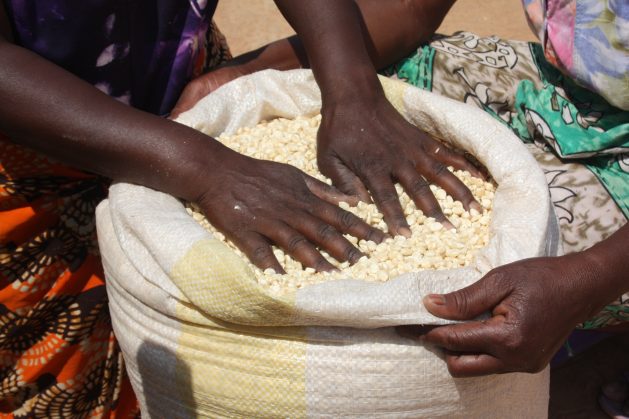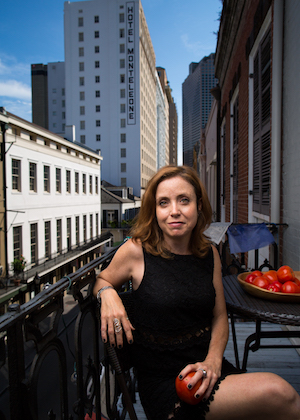Q&A: Vote with your Fork for a World Free from Hunger

BULAWAYO, Zimbabwe, Nov 30 (IPS) - A world free from hunger is possible but only if we change how we grow and eat food. And resetting the food system — including all aspects of production, processing, marketing, distribution and the consumption and nutrition of food — is key to securing a sustainable food future post COVID-19.
“We need not return to the normal we had before COVID-19 but we need to create a new food system that has opportunities to make changes.
“There is a real commitment from all sectors now not just looking at food security but nutrition security too. For a long time we have focused on quantity and calories. COVID-19 has exposed that we also need to focus on quality. Diet-related diseases are a major risk factor for mortality from the virus,” says Danielle Nierenberg, a world-renowned researcher, activist, food system expert and co-founder of the United States think tank, Food Tank.
The global food system is under strain. The Food and Agriculture Organisation of the United Nations (FAO) projects that agriculture production needs to grow by 70 percent to feed more than 9 billion people in the world by 2050.
But hunger, malnutrition, obesity, and food waste and loss are on the rise. There are increasing impacts of climate change and now COVID-19.
“We have seen supply chain disruptions as a result of COVID-19 and how our global food system is fragile and vulnerable. Farmers have had to pivot and make changes after supply chain disruptions that have seen schools, restaurants, and hotels close down. Farmers have had to find new markets,” Nierenberg, who is also recipient of the 2020 Julia Child Award, tells IPS.
Resetting the food system is everyone’s business, she adds. This includes farmers, policy makers and researchers to ensure sustainable and resilient ways of growing healthy and abundant food for all.
“We need a food revolution in agriculture now. We need agriculture that is more sustainable and more resilient and that prepares us for shocks, climate crisis and global pandemics,” Nierenberg tells IPS in an interview ahead of the ‘Resetting the Food System from Farm to Fork’, an international dialogue co-hosted by the Barilla Foundation and Food Tank that will take place online on Dec. 1.
The high level dialogue will highlight the critical role of farmers in feeding the world and managing natural resources, food business in progress towards the 2030 Agenda as well as chefs in redesigning food experiences.
Excerpts of the interview follow:

Inter Press Service (IPS):Food systems is the buzz word on the global food agenda, why food systems?
Danielle Nierenberg (DN) : You have producers, farmers, civil society groups, key decision makers and business leaders all looking at issues of food and agriculture holistically. Food systems are complex because they are interlinked to everything else that goes on in the world.
Food impacts everything we do; from the economy to social, racial, cultural equity. So looking at food through a systems lens, we can see the interconnections and how much our daily existence is linked to how we produce and consume food, hence the interest in food systems.
IPS: How do we transform food systems to deliver what we need rather than what we are getting now?
DN: We need commitment and unity from all sectors. Policy makers will have to be enlightened, businesses will have to change and produce farmers will have to diversify. That will be the key outcome from COVID-19. We cannot rely on mono-culture systems because they are fragile. Eaters too have to change some of their practices. More people are cooking from home because they have to and are learning how to eat better, nutritious food but they will have to demand that change. Food Tank has been using the term ‘citizen eater’ – someone who votes with their fork as well as their vote. They vote for the kind of food system they want, this is one way to go. Consumers have a lot of power that they have not used effectively.
IPS: Are we on track to meet the SDGs? 2030 is 10 years away but we still grappling with hunger, malnutrition and under nutrition, especially in the developing world.
DN: Absolutely. The poorest and most vulnerable are suffering not because of COVID-19 but due the climate crisis. I tend to be an optimist. The SDGs set out some major commitments which I think are achievable over the next nine years. We need real commitment. COVID-19 has set us back with hunger on the rise and there will be likely 80 million hungry people this year than they were last year. More needs to be done to make sure these people are getting the food and nutrition they need.
The problem has always been one of distribution and not of lack of food. There is now attention being paid to food loss and food waste. We are foreseeing a lot of food going to waste this year as farmers produced but they have had no markets. For farmers to gain markets we need better technology and innovation to help them to do that.
What is different this year is we are seeing increased hunger in the global north countries too. There are massive lines at food banks in United States and parts of Europe where so many people are affected who never experienced hunger before. This is a wake-up call to the world to act if we are to achieve the SDGs.
IPS: The theme for this year’s dialogue, ‘resetting the food system from farm to fork’. Tell us more.
DN: This is one of the very first events leading up to the U.N. Food Systems Summit that will take place in the fall of 2021.
We are bringing together leading thinkers from around the world on food and agriculture. The topics we have outlined are some of the biggest issues that need to be addressed at the U.N. Food Systems Summit. We are setting the stage for what happens next year. Inclusivity is needed and farmers should be part of these discussions.
We have farmers like Edie Mukiibi, the Vice President of Slow Food international; Leah Penniman, an author, educator and farmer in the U.S. doing a lot to improve the lives of black farmers; chefs like Massimo Bottura who is interested in reducing food loss and food waste and another chef, Dan Barber, who has achieved significant results in creating regenerative agriculture system at his farm and restaurant.
Bobby Chinn, a TV personality and chef from Cairo teaches students about sustainable agriculture practises. We have economists too, like Jeffery Sachs and Chris Barrett, who are thinking about how to create a new food economy.
We also have experts looking at the intersection between food and technology and how technology can help farmers produce better quality food and a more democratised food system where everyone has access to food.
Agnes Kalibata, the U.N. special envoy for the Food Systems Summit and President of the Alliance for a Green Revolution in Africa (AGRA) will close the event and talk about where we go from here over the next ten months before the summit happens.
IPS: Lastly, how would food systems transformation look like for smallholder farmers, who keep the world fed?
DN: Gosh. If we transform the food system, we should be recognising farmers. Farmers lack the respect all over the world. They are not honoured for the work they do, not just as producers but as stewards of the land and business people. They are the ones who keep us fed but we think of them as second class citizens, people who are not smart enough to do anything else. If we can honour the brilliance of farmers that will go a long way in transforming our food and agriculture system.
© Inter Press Service (2020) — All Rights Reserved. Original source: Inter Press Service
Where next?
Browse related news topics:
Read the latest news stories:
- When Ethnic Violence Turns Women Against Women Tuesday, March 18, 2025
- Pioneering Sustainable Energy Solutions in Africa Tuesday, March 18, 2025
- ‘Intolerable’ suffering in Gaza amid deadly airstrikes, continued aid blockade Tuesday, March 18, 2025
- Human Rights Council focuses on Iran, Syria, Venezuela Tuesday, March 18, 2025
- Cyprus talks show ‘new atmosphere’ between divided island’s leaders: Guterres Tuesday, March 18, 2025
- UN migration agency forced to restructure amid significant budget cuts Tuesday, March 18, 2025
- Funding Disruptions Are a Systemic Failure – Philanthropy Must Do What’s Right and Support Local Leadership Monday, March 17, 2025
- The United States Confronts the Demographic Piper Monday, March 17, 2025
- Papua New Guinea: Years of Environmental Clean Up Ahead Following New Report on Abandoned Bougainville Mine Monday, March 17, 2025
- WTO: Standing Tall as the Winds Howl Monday, March 17, 2025